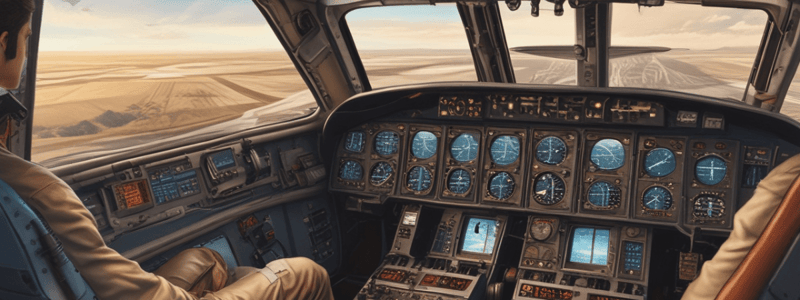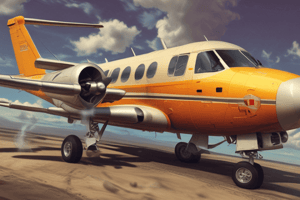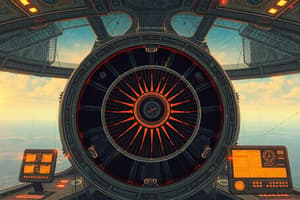Podcast
Questions and Answers
In nosewheel-type airplanes, how should the elevator control be held?
In nosewheel-type airplanes, how should the elevator control be held?
- Full aft position
- Varies with headwind strength
- Neutral position (correct)
- Full forward position
What is the primary reason to minimize engine power during downwind taxiing?
What is the primary reason to minimize engine power during downwind taxiing?
- To maintain aircraft control
- To reduce the risk of wind shear
- To reduce the risk of runway incursion
- To avoid overheating the brakes (correct)
What is the recommended approach to brake application during taxiing?
What is the recommended approach to brake application during taxiing?
- Ride the brakes to control speed
- Apply brakes only occasionally (correct)
- Use the throttle to control speed
- Apply brakes gradually and continuously
When should the throttle be at idle during taxiing?
When should the throttle be at idle during taxiing?
Why should the nosewheel be straight ahead when stopping the airplane?
Why should the nosewheel be straight ahead when stopping the airplane?
How do certain makes and models of airplanes control turns during taxiing?
How do certain makes and models of airplanes control turns during taxiing?
What is a characteristic of nosewheel-type airplanes during crosswind taxiing?
What is a characteristic of nosewheel-type airplanes during crosswind taxiing?
What is the primary purpose of a visual preflight assessment?
What is the primary purpose of a visual preflight assessment?
What should a pilot accomplish during taxiing according to the AFM/POH?
What should a pilot accomplish during taxiing according to the AFM/POH?
What is the term for an aircraft that conforms to its type design and is in condition for safe operation?
What is the term for an aircraft that conforms to its type design and is in condition for safe operation?
What is a key factor that experienced pilots consider during ground operations to maintain their margin of safety?
What is a key factor that experienced pilots consider during ground operations to maintain their margin of safety?
What is the primary responsibility of a pilot during ground operations?
What is the primary responsibility of a pilot during ground operations?
What is the main focus of this chapter?
What is the main focus of this chapter?
What should be checked in the instrument case of a conventional wet magnetic compass?
What should be checked in the instrument case of a conventional wet magnetic compass?
What is the benefit of allowing time for flight preparation during ground operations?
What is the benefit of allowing time for flight preparation during ground operations?
What is the outcome of a pilot's failure to conduct a thorough preflight assessment?
What is the outcome of a pilot's failure to conduct a thorough preflight assessment?
What should a pilot do if the VSI does not show a zero reading?
What should a pilot do if the VSI does not show a zero reading?
What is the relationship between ground operations and situational awareness?
What is the relationship between ground operations and situational awareness?
Who is authorized to adjust the mechanical VSI?
Who is authorized to adjust the mechanical VSI?
What should a pilot do before checking the avionics?
What should a pilot do before checking the avionics?
What is specified in the AFM/POH for advanced avionics aircraft preflight inspections?
What is specified in the AFM/POH for advanced avionics aircraft preflight inspections?
What should a pilot check during the inspection of the outer wing surfaces and tail section?
What should a pilot check during the inspection of the outer wing surfaces and tail section?
What is the recommended sequence for inspecting the aircraft?
What is the recommended sequence for inspecting the aircraft?
What should a pilot do to ensure a thorough preflight inspection?
What should a pilot do to ensure a thorough preflight inspection?
What is the primary reason for identifying marginal weather or environmental conditions as a hazard?
What is the primary reason for identifying marginal weather or environmental conditions as a hazard?
What is the primary consequence of not properly assessing the pilot's lack of training?
What is the primary consequence of not properly assessing the pilot's lack of training?
What is the definition of risk in the context of aviation?
What is the definition of risk in the context of aviation?
What is the primary purpose of risk assessment in aviation?
What is the primary purpose of risk assessment in aviation?
What is a hazard in the context of aviation?
What is a hazard in the context of aviation?
What is the primary benefit of risk assessment for pilots?
What is the primary benefit of risk assessment for pilots?
What is the primary consideration for pilots when conducting a risk assessment?
What is the primary consideration for pilots when conducting a risk assessment?
What is the primary purpose of having viable alternatives available in the event the original flight plan cannot be accomplished?
What is the primary purpose of having viable alternatives available in the event the original flight plan cannot be accomplished?
What should the flight instruments indicate during taxiing?
What should the flight instruments indicate during taxiing?
Why is it important to consider the location of other aircraft during the before-takeoff check?
Why is it important to consider the location of other aircraft during the before-takeoff check?
What is the purpose of the before-takeoff check?
What is the purpose of the before-takeoff check?
How many engine run-ups are typically performed before takeoff?
How many engine run-ups are typically performed before takeoff?
Why is it important to taxi to a run-up position near the takeoff end of the runway?
Why is it important to taxi to a run-up position near the takeoff end of the runway?
What should the directional gyro indicate during taxiing?
What should the directional gyro indicate during taxiing?
What is the purpose of the vertical speed indicator (VSI) during taxiing?
What is the purpose of the vertical speed indicator (VSI) during taxiing?
What is the typical location for performing the before-takeoff check?
What is the typical location for performing the before-takeoff check?
During the preflight inspection, what should the landing gear control be set to?
During the preflight inspection, what should the landing gear control be set to?
What should be checked during the electrical system checks?
What should be checked during the electrical system checks?
During the fuel system checks, what should be verified?
During the fuel system checks, what should be verified?
What should the airspeed indicator read during the preflight inspection?
What should the airspeed indicator read during the preflight inspection?
What should be inspected during the aircraft exterior inspection?
What should be inspected during the aircraft exterior inspection?
What should be checked during the instrument checks?
What should be checked during the instrument checks?
What should be confirmed during the preflight inspection?
What should be confirmed during the preflight inspection?
Why is a dirty, scratched, or severely crazed window a concern?
Why is a dirty, scratched, or severely crazed window a concern?
What should be inspected on the airplane skin in areas such as spar lines and attach points?
What should be inspected on the airplane skin in areas such as spar lines and attach points?
Why should extra care be exercised on metal airplanes for wingtips, fairings, and non-structural covers?
Why should extra care be exercised on metal airplanes for wingtips, fairings, and non-structural covers?
What should pilots inspect for around rivet heads during preflight inspection?
What should pilots inspect for around rivet heads during preflight inspection?
What should pilots check on the leading edges of the wing, horizontal stabilizer, and vertical stabilizer?
What should pilots check on the leading edges of the wing, horizontal stabilizer, and vertical stabilizer?
What is the purpose of 'stop-drilling' cracks in non-structural covers?
What is the purpose of 'stop-drilling' cracks in non-structural covers?
Why should pilots inspect spar lines on the wing, horizontal stabilizer, and vertical stabilizer?
Why should pilots inspect spar lines on the wing, horizontal stabilizer, and vertical stabilizer?
What should pilots inspect on the landing gear attachment areas?
What should pilots inspect on the landing gear attachment areas?
What may render the structure unairworthy if found on the leading edges of the wing, horizontal stabilizer, and vertical stabilizer?
What may render the structure unairworthy if found on the leading edges of the wing, horizontal stabilizer, and vertical stabilizer?
What is the primary purpose of inspecting the cabin door during the preflight assessment?
What is the primary purpose of inspecting the cabin door during the preflight assessment?
What document is required to be on board for flights outside the United States or for airplanes greater than 12,500 pounds?
What document is required to be on board for flights outside the United States or for airplanes greater than 12,500 pounds?
What should the pilot inspect during the visual preflight assessment of the cabin?
What should the pilot inspect during the visual preflight assessment of the cabin?
What is required to be inspected on the exterior of the aircraft during the preflight assessment?
What is required to be inspected on the exterior of the aircraft during the preflight assessment?
What should the pilot check during the inspection of the wings?
What should the pilot check during the inspection of the wings?
What is the purpose of the compass correction card?
What is the purpose of the compass correction card?
What should the pilot inspect during the preflight assessment of the aircraft's exterior?
What should the pilot inspect during the preflight assessment of the aircraft's exterior?
What document is required to be on board for all flights?
What document is required to be on board for all flights?
What should be checked during the aircraft exterior inspection?
What should be checked during the aircraft exterior inspection?
What should be inspected on the landing gear during the preflight inspection?
What should be inspected on the landing gear during the preflight inspection?
What should be verified during the fuel system checks?
What should be verified during the fuel system checks?
What should be checked during the electrical system checks?
What should be checked during the electrical system checks?
What is a critical aspect of inspecting the landing gear?
What is a critical aspect of inspecting the landing gear?
What should be inspected on the landing gear tires?
What should be inspected on the landing gear tires?
Why is it important to inspect the landing gear system thoroughly?
Why is it important to inspect the landing gear system thoroughly?
What should be done during the instrument checks?
What should be done during the instrument checks?
During the aircraft exterior inspection, what should be inspected on the airplane skin?
During the aircraft exterior inspection, what should be inspected on the airplane skin?
What should be confirmed during the preflight inspection of the landing gear?
What should be confirmed during the preflight inspection of the landing gear?
During the instrument checks, what should be inspected?
During the instrument checks, what should be inspected?
What should be verified during the fuel system checks?
What should be verified during the fuel system checks?
During the electrical system checks, what should be checked?
During the electrical system checks, what should be checked?
What should be inspected on nose gear airplanes?
What should be inspected on nose gear airplanes?
What should be inspected on conventional gear airplanes with a tailwheel or skid?
What should be inspected on conventional gear airplanes with a tailwheel or skid?
What should be inspected on wheel hubs?
What should be inspected on wheel hubs?
What should the master switch be turned to during the preflight inspection after confirming the landing gear handle is in the DOWN position?
What should the master switch be turned to during the preflight inspection after confirming the landing gear handle is in the DOWN position?
What should the airspeed indicator read during the preflight inspection?
What should the airspeed indicator read during the preflight inspection?
What should be inspected during the aircraft exterior inspection?
What should be inspected during the aircraft exterior inspection?
What should be checked during the fuel system checks?
What should be checked during the fuel system checks?
What should be confirmed during the preflight inspection?
What should be confirmed during the preflight inspection?
What should be inspected during the instrument checks?
What should be inspected during the instrument checks?
What should be checked during the electrical system checks?
What should be checked during the electrical system checks?
What should the altimeter indicate during the preflight inspection, when properly set to the current barometric setting?
What should the altimeter indicate during the preflight inspection, when properly set to the current barometric setting?
Flashcards are hidden until you start studying
Study Notes
Ground Operations
- Experienced pilots emphasize the importance of ground operations as it's where safe flight begins and ends.
- Preparation and preflight assessment are critical to mitigate airplane flight hazards.
Preflight Assessment of the Aircraft
- Ensures the aircraft meets regulatory airworthiness standards and is in a safe mechanical condition prior to flight.
- Includes visual inspection of:
- Airplane's airworthiness requirements
- Important inspection items (e.g., compass, VSI, avionics)
- Managing risk and resources
- Proper airplane surface movements using AFM/POH and airplane checklists
- Conforms to 14 CFR part 3, section 3.5(a), where "airworthy" means the aircraft meets its type design and is in a safe mechanical condition.
Outer Wing Surfaces and Tail Section
- AFM/POH specifies sequence for pilot to inspect the aircraft, often starting from the cabin entry access opening and moving counterclockwise.
- Pilot should also develop awareness for potential areas of concern, such as signs of deterioration or distortion of the structure, loose or missing rivets or screws.
Risk Assessment
- Risk is the future impact of a hazard that is not controlled or eliminated.
- Involves determining the degree of risk and whether it's worth the outcome of the planned activity.
- A hazard can be a real or perceived condition, event, or circumstance that a pilot encounters.
Taxiing
- Downwind taxiing requires less engine power after initial ground roll, and pilots should keep engine power to a minimum to avoid overheating brakes.
- Avoid continuously riding the brakes to control speed; instead, apply brakes only occasionally.
- When stopping, always stop with the nosewheel straight ahead to relieve side load and make it easier to start moving ahead.
- Crosswind taxiing requires rudder pressure to correct for wind direction.
Before-Takeoff Check
- Systematic AFM/POH procedure for checking engine, controls, systems, instruments, and avionics prior to flight.
- Normally performed after taxiing to a run-up position near the takeoff end of the runway.
- Includes checking oil temperature, engine run-ups, and instruments (e.g., altimeter, turn indicator, directional gyro).
Pre-Flight Inspection
- The pilot should inspect the aircraft for any distortions, skin damage, and fuel or oil leaks.
- Ensure the following documents are on board or attached to the aircraft:
- Current Airworthiness Certificate
- Current Registration Certificate
- Radio station license (if applicable)
- Operating limitations
- Current weight and balance data
- Compass correction card (if required)
- External data plate
Visual Preflight Assessment
- Inspect the cabin door and surrounding structure for any damage or misalignment.
- Check the interior cabin or flight deck for:
- Serviceable and dry carpeting
- Seat belts and shoulder harnesses for fraying, proper latching, and secure attachment
- Seats properly latched into seat rails
- Inspect the windshield and windows for cleanliness and cracks.
- Examine critical areas, including:
- Spar lines (lateral rivet lines) for distortion, ripples, or bubbles
- Wing, horizontal, and vertical attach points for damage
- Leading edges of wings, horizontal stabilizer, and vertical stabilizer for impact damage
- Aerodynamic devices, such as stall fences, slots, or vortex generators
- Deicing equipment, such as weeping wings and boots
- Inspect metal airplanes for cracks radiating from screw holes or concentrated radii.
Pre-Flight Checklist
- Use the AFM/POH or a third-party checklist to conduct the visual preflight inspection.
- Include the following items in the preflight inspection:
- Landing gear control is DOWN (if applicable)
- Master, alternator, and magneto switches are OFF
- Control column locks are REMOVED
- Fuel selectors operate properly in all positions
- Trim wheels are set for takeoff position
- Mechanical air-driven gyro instruments are inspected for signs of hazing
- Avionics master is OFF
- Circuit breakers are checked IN
- Landing gear handle is in the DOWN position
- Master switch is turned ON
- Fuel quantities are checked against tank levels
- Fuel pumps are turned ON (if equipped)
- Lights for interior and exterior positions are checked
- Annunciator panels are checked (if equipped)
- Landing gear down and locked lights are checked (if equipped)
- Ensure flight instruments read correctly:
- Airspeed should read zero
- Altimeter indicates the field elevation within 75 feet for IFR flight
- Magnetic compass indicates the airplane's direction accurately
Landing Gear Inspection
- The pilot should follow the AFM/POH during inspection to determine that the landing gear is ready for operation.
- Inspect the landing gear system, looking for hydraulic fluid leaks, grease, oil, or fluid.
- Verify landing gear alignment and height consistency.
- Check landing gear shock struts for proper inflation, cleanliness, and freedom from damage.
- Inspect axles, links, collars, over-center locks, push rods, forks, and fasteners for cracks, corrosion, and rust.
- Check tires for proper inflation, remaining tread, and normal wear pattern.
- Inspect wheel hubs for cracks, corrosion, and rust, and ensure all fasteners are secure.
- Check brakes and brake systems for rust and corrosion, and ensure all fasteners and safety wires are secure.
- Inspect shimmy dampers on tricycle gear airplanes for secure attachment and freedom from hydraulic fluid leaks.
- On conventional gear airplanes, inspect bungee cords for security and condition.
Engine and Propeller
- Identify and mitigate potential hazards prior to flight to prevent risks.
- Conduct a visual preflight inspection using the AFM/POH or a third-party checklist.
- Check the following items during the preflight inspection:
- Landing gear control is DOWN, if applicable.
- Master, alternator, and magneto switches are OFF.
- Control column locks are REMOVED.
- Fuel selectors are checked for proper operation in all positions.
- Trim wheels are set for takeoff position.
- Mechanical air-driven gyro instruments are inspected for signs of hazing.
- Avionics master is OFF.
- Circuit breakers are checked IN.
- Landing gear handle is in the DOWN position, and the master switch is ON.
- Fuel quantities are checked on the fuel gauges and compared to the tank level by visual inspection.
- Fuel pumps may be placed in the ON position to verify fuel pressure.
- Lights for both interior and exterior airplane positions are operating.
- Annunciator panels are checked.
- Flight instruments are checked:
- Airspeed should read zero.
- Altimeter should indicate the field elevation within 75 feet for IFR flight.
- Magnetic compass should indicate the airplane's direction accurately.
- Compass correction card should be legible and complete.
Studying That Suits You
Use AI to generate personalized quizzes and flashcards to suit your learning preferences.




